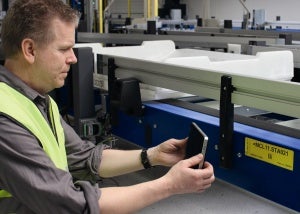
Crisplant, part of BEUMER Group and a leading global supplier of automated baggage handling systems, facilitates baggage handling system productivity gains through the use of tablet computers, to keep systems running smoothly and efficiently.
For some time now Crisplant has been working with airport operators using tablet devices to keep their baggage handling systems running at full capacity. Supervisors, managers and maintenance staff benefit significantly from using such devices in many ways.
An obvious use of a tablet is that they enable engineers to receive messages from the control centre about maintenance issues as they happen. But they also offer so much more. They are in fact a repository for a wealth of information about the system. In the past an engineer would attend a job but may not be able to complete it because they didn’t have the correct information to hand when they needed to look up something in technical documentation. They would then have to return to the workshop to pick up the technical documentation needed. But by using the documentation storage, search and retrieval function of the tablet device, the engineer has immediate access to all the latest information he requires. This might even be information that is so new it hasn’t yet appeared in the on-site printed documentation.
A tablet can even be configured to enable the user to virtually take the control room on a walk into the physical baggage handling system. Maintenance staff can zoom into a specific location to get an overview of the maintenance history for the part of the system they are standing next to. Depending on the level of detail required, a tablet camera can even scan the barcode of a smaller element in the system to give immediate access to an overview of its maintenance history.
The operator can use the tablet to retrieve information about single bags, for example, a bag found outside the conventional baggage handling process, such as on the floor in the baggage hall or, if lost from a trolley on the apron where the information about current screening status is imminent.
All these operational efficiencies mean staff spends less time walking and more time working.

